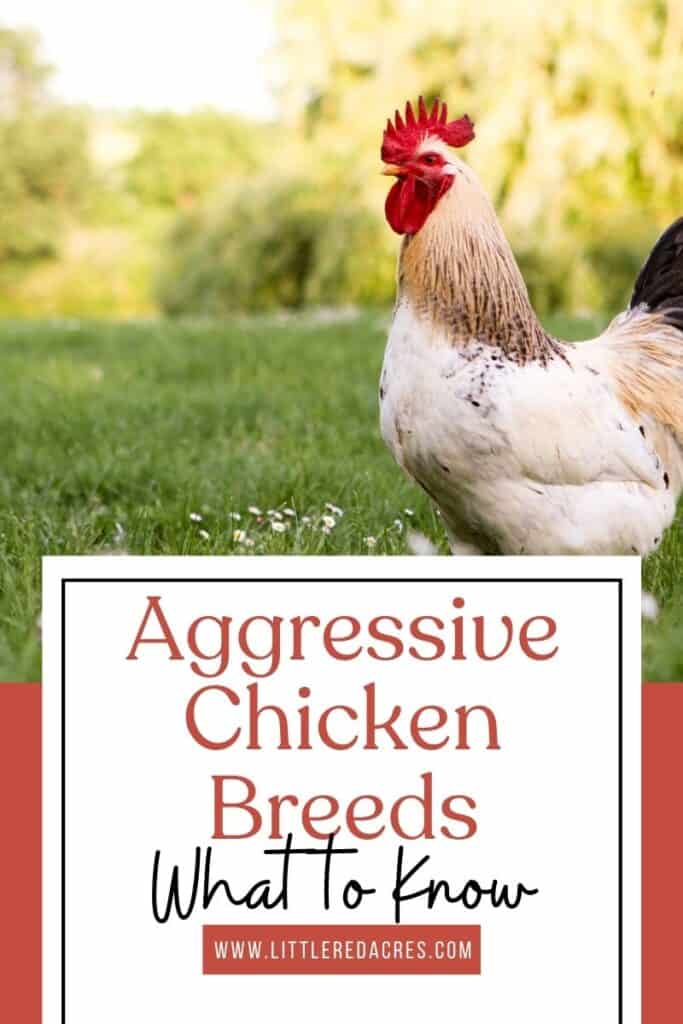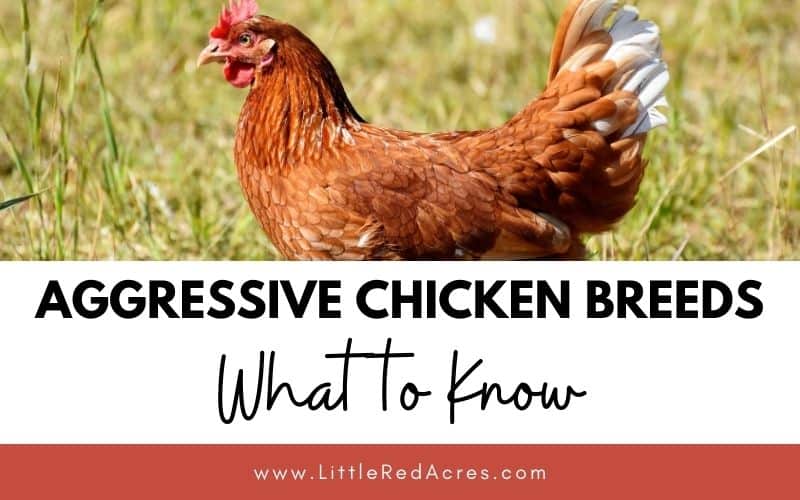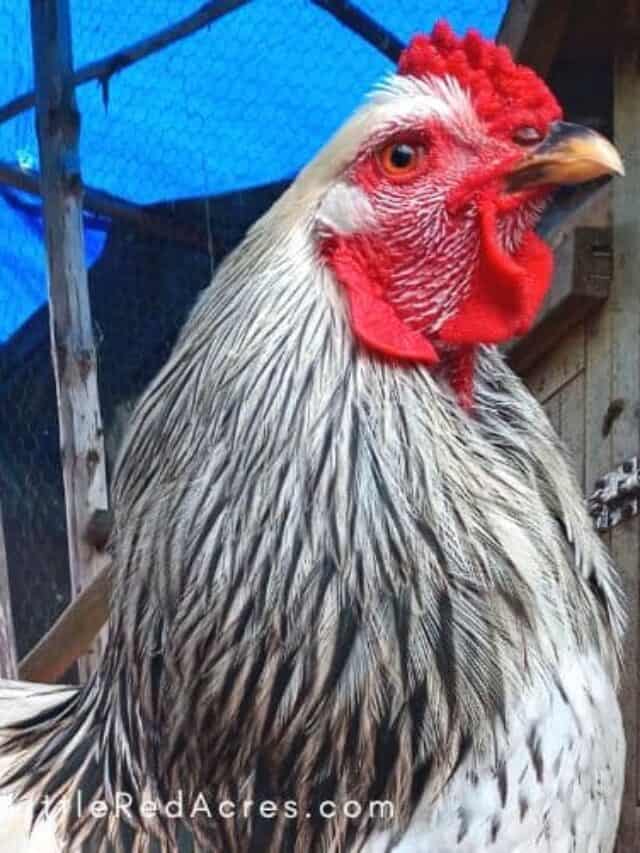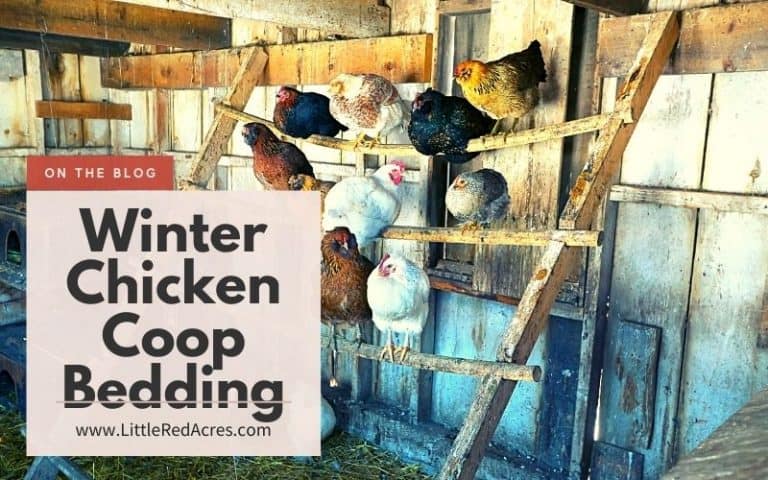5 Aggressive Chicken Breeds: What You Need to Know
Inside: Managing Aggressive Chicken Breeds: Tips to Tame Temperaments. Explore aggressive chicken breeds and effective strategies for peaceful coexistence.
While chickens are typically known for their gentle and docile nature, there are certain breeds that exhibit more aggressive behaviors. These aggressive chicken breeds can pose challenges for both novice and experienced poultry keepers.

This post may contain affiliate links, see my disclosure policy for more information.
Aggressive Chicken Breeds: What You Need to Know
Aggressive chicken breeds seems a little like labeling dogs to me.
I have heard many people say that bantam breeds are aggressive, yet I have a bantam rooster that is super sweet and breaks that mold for us.
How about we explore the reasons behind their behavior and offer tips on how to manage and work with them effectively?
Get updates & freebies delivered to your inbox!
Aggressive Chicken Breeds: The Basics
Not all chicken breeds are created equal when it comes to temperament. Some breeds have inherited characteristics that make them more prone to aggression.
Here are a few chicken breeds that are known for their aggressive tendencies:
Old English Game
Old Game Game chickens are one of the most aggressive chicken breeds. They were originally bred for cockfighting, so they have a lot of energy and aggression.
They can be quite territorial and may attack other animals and people if they feel threatened.
Malay
Malay chickens are also fairly aggressive. They were originally bred in Malaysia for cockfighting.
They’re known for being quick and agile, with sharp beaks that can inflict serious wounds.
Rhode Island Red
The Rhode Island Red is another breed of chicken that is known for its aggression. This bird is native to the United States and was originally bred for meat production.
Rhode Island Reds are large birds with red feathers and wattles. They are also very territorial and will attack anything that they perceive to be a threat.
Wyandotte Chickens
Wyandotte chickens are an American breed of chicken that is known for its aggressiveness. They have been known to attack humans and other animals, and even kill other chickens.
Wyandottes can also be quite noisy, which can be a nuisance to neighbors.
Leghorn
Leghorns are a breed of chicken that originates from Italy. They were originally bred for egg production but have since become popular as pets or exhibition birds.
Leghorns are small birds with white feathers and red combs.
They are not as aggressive as some of the other breeds on this list but can still be territorial if they feel threatened.
Leghorns do not need as much space as larger breeds and can typically be handled without too much difficulty.

Why Are Some Chicken Breeds Aggressive?
The aggressive behavior exhibited by these breeds can be attributed to various factors:
- Heritage and History: Some of these breeds have been bred for cockfighting or other competitive activities, where aggression was an advantage.
- Territorial Instincts: Chickens, by nature, are territorial creatures. Certain breeds may have stronger territorial instincts, leading to aggressive behavior when their space is encroached upon.
- Protective Instincts: Some aggressive breeds may be fiercely protective of their offspring or resources, such as food and nesting areas.
- Rooster Dynamics: Roosters, in general, can be more prone to aggression as they establish pecking orders and protect their hens.

Managing Aggressive Chicken Breeds
Raising aggressive chicken breeds can be challenging, but it is not impossible. With the right strategies and approaches, you can manage these birds effectively.
Here are some tips for handling and working with aggressive chicken breeds:
Early Socialization: Introduce young chicks to a variety of environments and other chickens. Early socialization can help reduce aggressive tendencies as they mature.
Spacious Living Quarters: Provide ample space for your chickens to roam, forage, and establish their territories without feeling cramped.
Separate Aggressive Birds: If you notice one bird is particularly aggressive, consider separating it from the rest of the flock to prevent injuries to other chickens.
Proper Nutrition: Ensure your chickens have access to plenty of feed to reduce aggression stemming from competition for food.
Rooster Management: If you have an aggressive rooster, consider whether it is necessary to keep him in the flock. Some roosters may need to be rehomed or replaced with a more docile one.
Keep Multiple Hens: Having more hens per rooster can help distribute their attention and reduce aggression between roosters competing for mates. You need at least 7 hens per rooster if not more.
Taming: Spend time with your aggressive chickens to build trust. Gentle handling, treats, and positive reinforcement can help tame their aggressive tendencies.

Aggressive chicken breeds can be a handful, but with the right knowledge and care, they can become manageable members of your flock.
Understanding the reasons behind their behavior and employing strategies like early socialization, proper nutrition, and good rooster management can help create a more harmonious environment in your chicken coop.
Remember, while some breeds may have a reputation for aggressiveness, individual chickens can have varying temperaments. By being attentive to their needs and behavior, you can maintain a peaceful and productive flock, even when dealing with aggressive chicken breeds.
Want More?
Chickens that Lay Medium Sized Eggs
10 Best Chicken Breeds for Beginners






